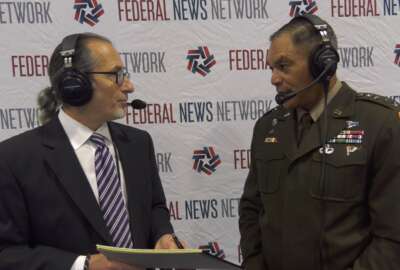
Senator looking into potential pay abuse at ATF
In today's Federal Newscast, Senator Chuck Grassley (R-Iowa) is looking into pay abuse at the law enforcement agency.
To listen to the Federal Newscast on your phone or mobile device, subscribe in PodcastOne or Apple Podcasts. The best listening experience on desktop can be found using Chrome, Firefox or Safari.
- The National Archives and Records Administration joins the ranks of agencies looking to hire a chief data officer. NARA’s chief data officer will advise its chief information officer and chief technology officer on IT initiatives, as well as office heads and high-level managers across the agency. NARA expects to hire its CDO at the GS-15 level or above, and will require a top-secret security clearance. NARA will accept applications through Nov. 15.
- The Treasury Department’s Bureau of the Fiscal Service is looking at blockchain technology to streamline grant payments. The bureau is awarding a task order for blockchain technology, in order to improve transparency, reduce reporting burdens, and combat improper payments. The bureau’s task order seeks answers on how to set up digital wallets and enable cross-agency authorities. This effort builds on the bureau’s recent development of a blockchain-based grant payment request prototype.
- The Office of Personnel Management overcharged agencies by over $5 million for the costs of maintaining federal employees’ electronic personnel files. That’s according to a recent analysis from the OPM inspector general. OPM is supposed to charge agencies a flat rate depending on the number of employees with official personnel files under its management. The IG said OPM should pay its customer agencies back or adjust future billings to account for the mistakes. OPM said it will correct mistakes with its pricing and invoices.
- Sen. Chuck Grassley (R-Iowa) is looking into pay abuse at one federal agency. The Bureau of Alcohol, Tobacco and Firearms misclassified 94 administrative positions as law enforcement jobs. Those jobs were eligible for special pay that’s traditionally reserved for law enforcement officers in government. The Office of Personnel Management partially suspended ATF’s job classification authority after a review found problems with those 94 positions. Grassley said some ATF employees are earning higher pay than they should. He learned about the problems from a whistleblower at the agency.
- The Army’s 18th Airborne Corps is preparing its soldiers for future weapons, especially those that use advanced technologies. The corps is one of the biggest groups of soldiers and its new strategy will encourage them to train in coding, artificial intelligence and software. The goal is to ensure soldiers are ready to use new weapons instead of having to undertake a long training process once they get down to the unit level.
- The Army stood up a new organization to recruit and develop its civilian workforce. The Army Civilian Career Management Activity reached full operational capability this month. One of its first tasks has been to realign the civilian workforce’s 32 different specialties into 11 broader “career fields.” The goal is to let employees use their skills in a broader range of assignments. The office also plans to lead an Army wide-approach to civilian recruiting – including by marketing and branding the Army as a civilian employer, not just a military one.
- The Army will soon take concrete steps to make its bases safer and more resilient. The Army said it is working on an implementation plan to make its installations more resilient to things like climate change and cyber attacks. The service came out with a new strategy for protecting its bases late last year. Now it’s almost done forming more than 30 steps to make that plan happen. Some of those include building a center of excellence based solely on bases and using nature to deter climate change effects. The Army also wants to create a timeline to improve quality of life on base over the next five to 12 years.
- A 63-year-old man will serve two years in prison for making threatening phone calls to employees at the Veterans Affairs medical center in Albany. Robert Seifert made multiple phone calls and left voicemails with three VA employees. The Justice Department and VA inspector general’s office said Seifert used language that made the employees fear for their own safety. The VA inspector general and the police service at the department’s medical center in Albany investigated the case. The U.S. District Court for the Northern District of New York prosecuted the case.
- A key regulatory agency is urging electricity providers to up their cybersecurity game. In a new report, the Federal Energy Regulatory Commission said companies generally met mandatory reliability standards for cybersecurity over the past year. But FERC also recommended they improve their oversight of critical digital systems and tighten controls around who can access those systems. FERC said such improvements would increase the security of the nation’s electric grid. The report comes as the Biden administration has sought close cooperation with the electricity sector on cybersecurity initiatives.
- Finally, a survey of public sector IT executives that shows them optimistic about cybersecurity in the future. Security software vendor Beyond Trust asked 200 federal, state and local IT and security officials about the outlook for cybersecurity. Nearly all of them said they’ve got adequate funding to get the cyber job done. And they say the Executive Order on cybersecurity coupled with the 2022 appropriations outlook means they’ll continue to fight off threats. But IT people also say the continuing levels of remote employees is their number one cyber risk.
- It’s phishing season and the CIO Council reminded employees, it’s not a good idea to get caught up in the hackers’ nets. There’s spear phishing, whale phishing, and there is vishing and smishing. Basically, hackers are trying every approach to deceive and fool you into clicking on a link or giving them your password. The Federal CIO Council is warning federal employees to be aware of all of these tricks. As part of Cybersecurity Awareness Month, Energy Department chief information security officer Greg Sisson details many of these attack vectors in a new blog post. Sisson said an organization’s first line of defense against phishing is training and awareness. Sisson reminds agencies to fight the phish.
- Small businesses have just two more days to weigh in on the General Services Administration’s draft sections L and M of the impending solicitation for Polaris, the small business governmentwide acquisition contract. Section L is the instructions to offerors and Section M details the evaluation factors for award. GSA asked for comments on the draft sections of Polaris by Oct. 15. Additionally, GSA said it hopes to release a request for information for the GWAC later this month and release a draft request for proposals in the next few months.
- Commercial satellite companies have a new opportunity to win contracts from the intelligence community. The National Reconnaissance Office released the first of what’s expected to be a rolling wave of potential contracting opportunities geared toward commercial companies yesterday. The NRO’s Broad Agency Announcement Framework for Strategic Commercial Enhancements represents a big opening toward commercial industry for the secretive spy agency. The first focus area under the BAA is commercial radar capabilities. This initial area will be open to both U.S. domestic industry and foreign-owned U.S. companies.
Copyright © 2025 Federal News Network. All rights reserved. This website is not intended for users located within the European Economic Area.
Eric White
Eric White is news anchor and Federal Drive producer at Federal News Network.
Follow @FEDERALNEWSCAST
Related Stories
NARA sets workforce diversity goals, aims to put more records online, as part of strategic plan
Related Topics
Agency Oversight
All News
army recruiting
Blockchain
Bureau of Alcohol Tobacco Firearms and Explosives
Bureau of the Fiscal Service
Chuck Grassley
CIO Council
Congress
Federal Drive
Federal Energy Regulatory Commission
Federal Newscast
General Services Administration
Management
National Archives and Records Administration
National Reconnaissance Office
Pay
Pay & Benefits
Polaris
Satellites
Small business contracting
Tom Temin
Workforce
workplace safety





